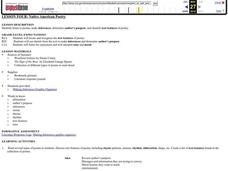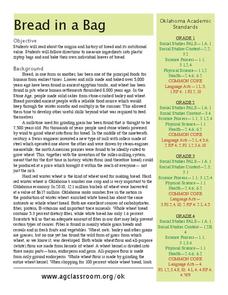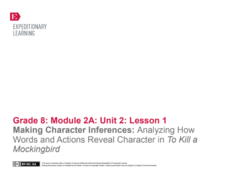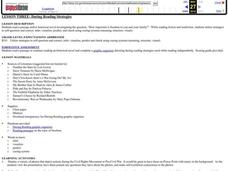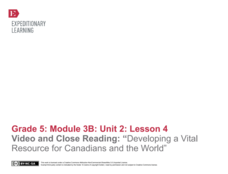Curated OER
Native American Poetry
Identify text features, make inferences, and discover the cultural significance of Native American Poetry. Sixth graders read several Native American poems and use graphic organizers and literature response logs to record their feelings...
Curated OER
Bread in a Bag
Could the history of bread really be interesting? Yes, it could! An informational text gives scholars wheat production background from 8,000 years ago, discussing different types of bread and the current industry in Oklahoma. Learners...
Curated OER
5th Grade Historical Fiction: Solder's Letter
A picture is worth a thousand words, but sometimes a single word can go a long way as well. Practice making inferences about character traits with a letter written from the perspective of a soldier in the American Revolution.
K5 Learning
The Bonfire in the Sea
Ever wonder why fish disappear from the surface of the water in cold weather? Fifth graders read a fun story about the magical fish tribe and their underwater bonfire before answering four comprehension questions.
EngageNY
Getting to Know Esperanza (Chapter 2: “Las Uvas/Grapes”)
Delve into Esperanza Rising by Pam Muñoz Ryan with close reading and evidence-based, text-dependent questions. Part of a unit series, this well-sequenced, Common Core designed instructional activity draws on material from the...
EngageNY
Mid-Unit Assessment and Discussing Themes in Esperanza Rising: (Chapter 9: "Las Ciruelas/PLums")
Give this skills-based assessment halfway through your unit on Esperanza Rising. After a brief review, class members take the test, which asks them to show that they know how to analyze the novel independently. They are asked to...
EngageNY
Making Character Inferences: Analyzing How Words and Actions Reveal Character in To Kill a Mockingbird
Partner up! After an I have/who has activity, readers partner with one of their discussion appointments to add evidence from chapters 11-13 in To Kill a Mockingbird to the Atticus Note-catcher. Partners then share with the class and add...
K5 Learning
Liza's First Spelling Bee
Learners read about Liza's first spelling bee before answering six reading comprehension questions. Skills include identifying similarities, making inferences, drawing conclusions, and answer questions based on explicit information in...
Curated OER
To Kill a Mockingbird Study Guide Part II
Focus your class's reading of To Kill a Mockingbird with this resource. Eighty-three questions are provided for chapters 12-31, the majority of which focus on plot recall. Since this is a word document, you can consider adding questions...
EngageNY
Understanding Themes in Esperanza Rising
Determining a theme or central idea is greatly emphasized in the Common Core standards. Target that skill though big metaphors and central symbols in Pam Muñoz Ryan's Esperanza Rising. Help your class reach the standard through...
Curated OER
Making Inferences While Identifying Similes and Metaphors
Use this lesson to study similes and metaphors and the inferred meaning. In this language arts lesson, 5th graders write their own similes and metaphors. A worksheet is provided for extension work or to check understanding as homework.
Curated OER
Tomas and the Library Lady
Learners practice read aloud comprehension strategies. In this literacy comprehension lesson, students listen to Tomas and the Library Lady, stopping to discuss with a partner aspects of the story suggested by the teacher. Learners make...
Curriculum Corner
Riddle Cards
What better way to introduce making inferences than with riddle cards? Young readers practice making inferences through riddle cards and other types of reading, while filling out graphic organizers. The resource even comes with...
Reading for Meaning
Sample Lessons and Worksheets
If you need to bulk up your reading comprehension worksheet collection, take a look at a resource that includes graphic organizers and reading comprehension questions. The series of 50 worksheets addresses novels such as Julie of...
Have Fun Teaching
Making Inferences (8)
Kids examine the clues provided by a prompt to infer what will happen next. They then illustrate the short story.
Curated OER
"All Summer in a Day" by Ray Bradbury
After reading "All Summer in a Day," by Ray Bradbury, have your learners respond to these questions. The instructional activity starts out with comprehension questions and moves into higher-level inference and judgment questions. This...
Curated OER
"Monsters Are Due on Maple Street" by Rod Serling
These questions ask learners to think about the text "Monsters Are Due on Maple Street" in a variety of ways. In addition to practicing reading comprehension, class members work on interpreting, making inferences and connections,...
Curated OER
Poems: "The Rabbit"
In pairs or on their own, fourth graders read the poem, "The Rabbit." They then answer eight critical-analysis questions, requiring them to make inferences, and interpret the poem's meaning and use of language. The reading passage,...
Curated OER
During Reading Strategies
"How important is freedom to you and your family?" The guiding question becomes much more powerful after your class reads and responds to a passage from a historical novel. While reading the passage, they complete a graphic organizer...
Curated OER
"The Clever Monkey"
First graders read and discuss the story elements of the book "The Clever Monkey" by Rob Cleveland. They discuss the continent of Africa, then answer story comprehension questions. Students then complete words, adjectives, sequencing,...
EngageNY
Learning About Farms in Colonial America: Explicit vs. Inferred Information
Aid your pupils in understanding the terms explicit and inferred while teaching them about colonial farmers. The third activity in the module builds off the previous activity and focuses heavily on inference. Learners analyze a...
Curated OER
Mixed Up Chameleon
Students discover facts about chameleons. In this adaptations lesson, students read a book about chameleons and discuss the adaptations they have to survive. Students also discuss predator and prey of the chameleon. Students make...
Curated OER
Phineas Gage: “This I Believe” Venn Diagrams After Reading Strategy
Difficulties with brain injuries still continue today. After reading Phineas Gage: A Gruesome but True Story About Brain Science, class members read a series of modern personal essays about brain injuries and choose an essay to compare...
EngageNY
Video and Close Reading: “Developing a Vital Resource for Canadians and the World”
Scholars watch Developing a Vital Resource for Canadians and the World to learn about the supplement potash that helps plants grow. They watch the video several times, completing a note catcher to record key ideas along the way....
